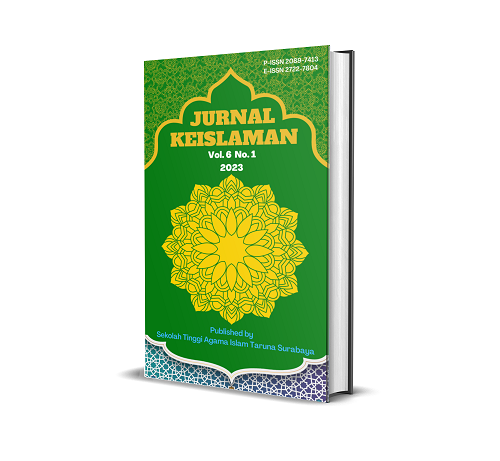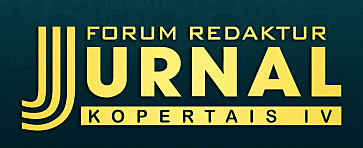Perspektif Peserta Didik Abad 21: Relevansinya Dengan Pemikiran Imam Al-Ghazali Dalam Kitab Ayyuhal-Walad
Abstract
The era of digitalization has a real and broad effect from various walks of life, one of which demands in governance and the education system is clear evidence that this era is a new challenge in the world of education. Education is expected to be able to produce full quality human seed products, which are called 21st century competencies. 21st century competence is the main ability that must be pocketed by students in order to collaborate in real life in the 21st century. In the 21st century, the challenge is given to be able to create education that can participate in producing thinkers who are qualified in the development of economic and social order and are aware of how to become a decent citizen of the world in the 21st century. This study aims to describe 21st century students and look for relationships or relevance to Al Ghazali's thoughts regarding students in the book of Ayyuhal-Walad. The research method applied is descriptive qualitative. The results of the study indicate that Imam al-Ghazali's thoughts in his book, have relevance to the perspectives of 21st century students related to character education until now the main focus in education. and the 21st century teaches them to judge the good and the bad of all things. In accordance with the thoughts of Imam Al Ghazali in his book Ayyuhal-Walad which contains advice and suggestions to do good things and consider bad things.References
Al-Ghazali. Ayyuhal-Walad. Libanon: Darul Manhaj, 1112.
Al-Lathif, M. Ghofur. Hujjatul Islam Imam al-Ghazali. Yogyakarta: Araska, 2020.
Amran, Amran, Magfirah Perkasa, Ismail Jasin, Muhammad Satriawan, dan Muhammad Irwansyah. “Model Pembelajaran Berbasis Nilai Pendidikan Karakter Untuk Generasi Indonesia Abad 21.†Lentera Pendidikan : Jurnal Ilmu Tarbiyah dan Keguruan 22, no. 2 (2019): 233. https://doi.org/10.24252/lp.2019v22n2i5.
Andrew Pakpahan dkk. Metodologi Penelitian Ilmiah. Medan: Yayasan Kita Menulis, 2021.
Cosmas Gatot Haryono. Ragam Metode Penelitian Kualitatif Komunikasi. Sukabumi: CV Jejak, 2020.
Desi Rahmawati dkk. Kisah Profesi Pendidik Abad 21. Tangerang Selatan: Pascal Books, 2021.
Etistika Yuni Wijaya, Dwi Agus Sudjimat, dan Amat Nyoto. “Transformasi Pendidikan Abad 21 Sebagai Tuntutan.†Jurnal pendidikan 1 (2016): 263–78.
Evanirosa dkk. Metode Penelitian Kepustakaan (Library Research). Bandung: Media Sains Indonesia, 2022.
Feni Rita Fiantika dkk. Metodologi Penelitian Kualitatif. Padang: PT. Gobal Eksekutif Teknologi, 2022.
H. Ahmad Luthfi dkk. Metodologi Penelitian Ekonomi. Solok: Insan Cendekia Mandiri, 2022.
H. M. Muchlis Sholichin. Psikologi Belajar. Surabaya: Pena Salsabila, 2013.
Hasibuan, Ahmad Tarmizi, dan Andi Prastowo. “Konsep Pendidikan Abad 21: Kepemimpinan Dan Pengembangan Sumber Daya Manusia Sd/Mi.†MAGISTRA: Media Pengembangan Ilmu Pendidikan Dasar dan Keislaman 10, no. 1 (2019): 26–50. https://doi.org/10.31942/mgs.v10i1.2714.
Kemendikbud. Permendikbud tentang Kompetensi Inti dan Kompetensi Dasar Pelajaran pada Kurikulum 2013 pada Pendidikan Dasar dan Menengah. Jakarta: Kemendikbud, 2018.
Komara, Endang. “Penguatan Pendidikan Karakter dan Pembelajaran Abad 21.†SIPATAHOENAN: South-East Asian Journal for Youth, Sports & Health Education 4, no. 1 (2018): 17–26.
Mamik. Metodologi Kualitatif. Sidoarjo: Zifatama, 2015.
Mashudi, Mashudi. “Pembelajaran Modern: Membekali Peserta Didik Keterampilan Abad Ke-21.†Al-Mudarris (Jurnal Ilmiah Pendidikan Islam) 4, no. 1 (2021): 93–114. https://doi.org/10.23971/mdr.v4i1.3187.
Saringatun Mudrikah dkk. Inovasi Pembelajaran di Abad 21. Sukoharjo: Pradina Pustaka, 2022.
Sukmawati, Fatma, dan Santosa Eka Budhi. Technological Pedagogical Content Knowledge dalam Pembelajaran Abad 21. Sukoharjo: Pradina Pustaka, 2022.
Sutianah, Cucu. “Peningkatan Kompetensi Kerja berbasis Integrasi Soft Skills, Hard Skills dan Entrepreneur Skills Program Keahlian Kuliner melalui Penerapan Teaching Factory SMK.†Jurnal Ekonomi, Sosial & Humaniora 2, no. 08 (2021): 152–67.
Tim Ganesha Operation. Pasti Bisa Geografi Untuk Kelas SMA/MA KElas X. Bandung: Penerbit Duta, 2017.
Copyright (c) 2023 Moh. Faizin, Maslihan Maslihan, Afi Rizqiyah

This work is licensed under a Creative Commons Attribution-ShareAlike 4.0 International License.
Authors who publish with this journal agree to the following terms:
- Authors retain copyright and grant the journal right of first publication with the work simultaneously licensed under a Creative Commons Attribution-ShareAlike that allows others to share the work with an acknowledgement of the work's authorship and initial publication in this journal.
- Authors are able to enter into separate, additional contractual arrangements for the non-exclusive distribution of the journal's published version of the work (e.g., post it to an institutional repository or publish it in a book), with an acknowledgement of its initial publication in this journal.
- Authors are permitted and encouraged to post their work online (e.g., in institutional repositories or on their website) prior to and during the submission process, as it can lead to productive exchanges, as well as earlier and greater citation of published work (See The Effect of Open Access).






















